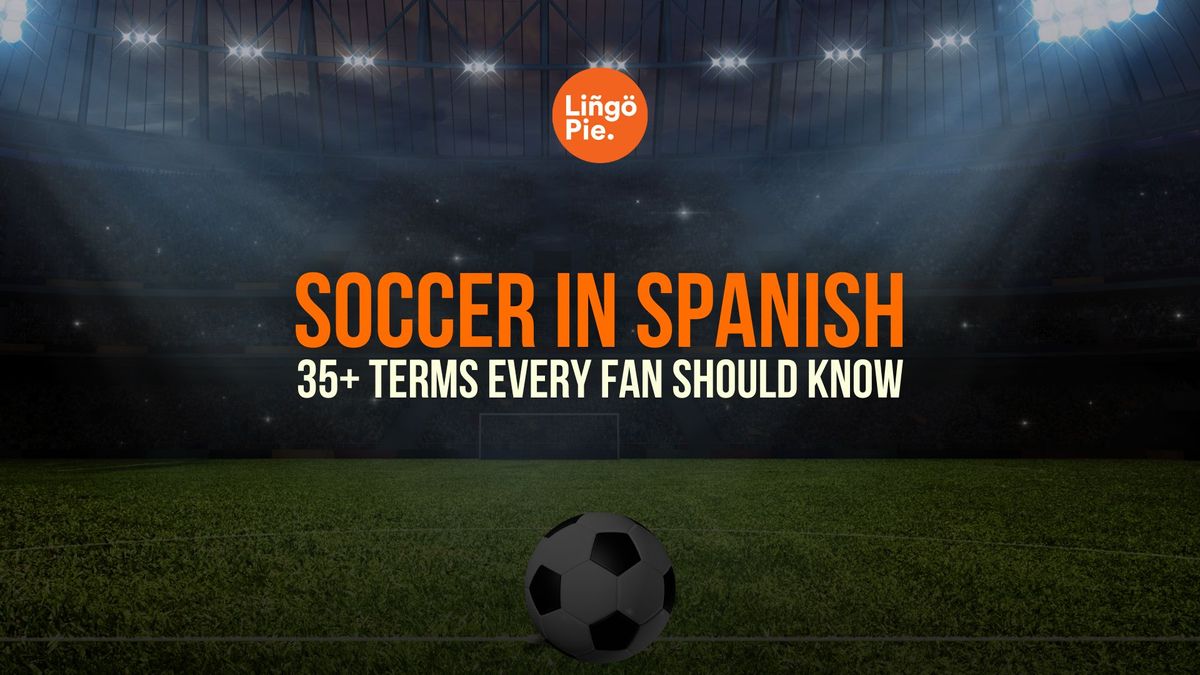Let's be real - if you've spent any time around Spanish speakers, you know soccer is kind of a big deal. Think about it - when was the last time you walked past a Spanish bar or restaurant without seeing a game on TV? Or tried following your Spanish-speaking friend's Instagram stories during World Cup season? Yeah, soccer talk is everywhere!
And if you're learning Spanish, knowing some basic soccer vocab will save you from that blank stare when everyone's buzzing about last night's match. Trust me, it's way more useful than those formal phrases gathering dust in your textbook.
In this post, I'll share the most common soccer terms in Spanish that'll help you join the conversation. After this, you'll definitely be able to join in on chats about El Deporte Rey (The King Sport).
- 25 Dominican Slang Terms You Gotta Know
- 17 Venezuelan Slang Terms You Need In Your Vocabulary
- 26+ Easy Guatemalan Slang Every Expat Should Know

What Is Soccer In Spanish?
In Spanish, soccer is called "fútbol" or "el fútbol" (pronounced foo-t-bol). While English speakers distinguish between "soccer" and "football," Spanish speakers keep it simple - it's just fútbol. Being a masculine noun, it always uses the article "el," and you'll often hear phrases like "jugar al fútbol" (to play soccer) or "ver el fútbol" (to watch soccer).
- "¿Te gusta el fútbol?" (Do you like soccer?)
- "Vamos a jugar al fútbol este domingo." (We're going to play soccer this Sunday.)
- "Mi hermano es fanático del fútbol." (My brother is a soccer fanatic.)
- "El fútbol es el deporte más popular en Argentina." (Soccer is the most popular sport in Argentina.)
The word "fútbol" is pretty straightforward to use, but here's a helpful tip: unlike in English where you might say "let's play some soccer," in Spanish you'll always include the article "al" when using it with the verb "jugar" - so it's "jugar al fútbol," never just "jugar fútbol."
Soccer Vocabulary In Spanish
Football Positions In Spanish
If you're watching a Spanish broadcast, you'll hear these positions mentioned about a hundred times per match. From the "portero" guarding the goal to the "delantero" hunting for the next score, knowing these positions is crucial - they're the building blocks of any soccer conversation.
| Spanish Term | Pronunciation | English |
|---|---|---|
| El portero | por-TEH-ro | Goalkeeper |
| El defensa | deh-FEN-sah | Defender |
| El lateral | lah-teh-RAL | Fullback |
| El central | sen-TRAL | Center back |
| El mediocampista | meh-dio-kam-PIS-ta | Midfielder |
| El delantero | deh-lan-TEH-ro | Forward |
| El extremo | eks-TREH-mo | Winger |
| El arquero* | ar-KEH-ro | Goalkeeper* |
*Used in some Latin American countries
To talk about players and their positions, you can use the simple Spanish phrase "Juega de [position]" (He/She plays as a [position]). This template works for any position you want to discuss, making it super easy to describe player roles.
- "Messi juega de delantero" (Messi plays as a forward)
- "Mi hermano juega de portero" (My brother plays as a goalkeeper)
- "Ella juega de mediocampista" (She plays as a midfielder)

Football Actions During Gameplay
This is where Spanish soccer vocabulary gets exciting! These are the words that'll have you jumping off your couch shouting "¡Pase!" or "¡Tiro!" along with the commentators. Spanish soccer commentary is famous for its energy and drama, and these action words are what make those goal calls so legendary.
Trust me, once you learn these, watching games in Spanish becomes ten times more fun.
| Spanish Term | Pronunciation | English |
|---|---|---|
| Patear | pah-teh-AR | To kick |
| Pasar | pah-SAR | To pass |
| Cabecear | kah-beh-seh-AR | To head the ball |
| Driblar/Regatear | dree-BLAR/reh-gah-teh-AR | To dribble |
| Taclear | tah-kleh-AR | To tackle |
| Marcar | mar-KAR | To score/mark |
| Tirar | tee-RAR | To shoot |
| Despejar | des-peh-HAR | To clear |
Want to describe what's happening in the game? Use "[Player] está [action]ando el balón" (Player is [action]ing the ball). This formula works with most soccer actions and is perfect for commenting on live plays.
- "Ronaldo está pateando el balón" (Ronaldo is kicking the ball)
- "El defensa está despejando el balón" (The defender is clearing the ball)
- "Los jugadores están pasando el balón" (The players are passing the ball)
Parts of the Stadium In Spanish
Ever tried describing where you were sitting at a match in Spanish? Or following directions to meet friends at the stadium? Whether you're heading to a local partido or watching the action from home, knowing these terms helps you understand everything from commentary about a corner kick to fans singing from "las gradas."
| Spanish Term | Pronunciation | English |
|---|---|---|
| La cancha | KAN-cha | The pitch/field |
| La portería | por-teh-REE-ah | The goal |
| El área | AH-reh-ah | The box |
| La grada | GRAH-dah | The stands |
| El banquillo | ban-KEE-yo | The bench |
| El córner | KOR-ner | Corner |
| El medio campo | MEH-dio KAM-po | Midfield |
| Las tribunas | tri-BOO-nas | Bleachers |
To talk about locations in the stadium, use "Está en [stadium part]" (It's in/at the [stadium part]). This simple phrase helps you describe where things are happening during the game.
- "El balón está en el área" (The ball is in the box)
- "Los fans están en las gradas" (The fans are in the stands)
- "El entrenador está en el banquillo" (The coach is on the bench)

Scoring Vocabulary In Spanish
Let's face it - this is what soccer's all about. The sweet sound of "¡GOOOL!" might be universal, but there's so much more to scoring vocabulary in Spanish. Plus, if you ever want to play a pickup game in a Spanish-speaking country, you'll definitely need to know these!
| Spanish Term | Pronunciation | English |
|---|---|---|
| El gol | GOL | Goal |
| El empate | em-PA-teh | Draw/Tie |
| La victoria | vik-TOR-ia | Victory |
| La derrota | deh-RO-ta | Defeat |
| Fuera de juego | fweh-ra deh HWEH-go | Offside |
| El penal | peh-NAL | Penalty |
| El marcador | mar-kah-DOR | Scoreboard |
| La prórroga | PRO-rro-ga | Extra time |
For describing game outcomes, use "Terminó con [scoring term]" (It ended with [scoring term]). This phrase helps you discuss match results like a native speaker.
- "Terminó con empate" (It ended in a tie)
- "Terminó con victoria" (It ended in victory)
- "El partido terminó con gol de último minuto" (The match ended with a last-minute goal)
Soccer/Football Equipment In Spanish
You might think equipment vocab is boring, but in Spanish, even talking about basic gear can sound poetic.
| Spanish Term | Pronunciation | English |
|---|---|---|
| El balón | bah-LON | The ball |
| Los botines | bo-TEE-nes | Cleats |
| La camiseta | kah-mee-SEH-ta | Jersey |
| Las medias | MEH-dias | Socks |
| Las espinilleras | es-pee-nee-YEH-ras | Shin guards |
| El silbato | sil-BAH-to | Whistle |
| Los guantes | GWAN-tes | Gloves |
| El uniforme | oo-nee-FOR-meh | Uniform |
When talking about equipment, use "Necesito [equipment]" (I need [equipment]). This simple phrase is perfect for both shopping and getting ready for a game.
- "Necesito nuevos botines" (I need new cleats)
- "Necesito una camiseta" (I need a jersey)
- "Necesito las espinilleras" (I need shin guards)

Level Up Your Spanish With These Soccer Films
Immersing yourself in Spanish soccer movies isn't just entertaining—it's a goldmine for language learners. These films put all those vocabulary words we just learned into real-world action, complete with authentic accents, soccer slang, and the kind of passionate expressions you'd hear at an actual match.
Plus, you'll pick up on cultural nuances about what soccer means in Spanish-speaking communities while training your ear to different Spanish dialects. It's basically a language lesson disguised as movie night!
Here are some must-watch soccer films you can stream on Lingopie:
El Portero ("The Goalkeeper")
This Colombian drama isn't just about saves and goals—it's a story that'll have you catching Spanish soccer lingo in its natural habitat. Follow a small-town goalkeeper's journey as he chases his dreams, all while picking up authentic Colombian expressions and soccer terminology that'll stick with you way better than any textbook could.
La Selección, El Juego de la Vida ("The National Team, The Game of Life")
This series dives deep into the golden age of Spanish soccer, giving you a perfect mix of sports vocabulary and everyday Spanish conversations. You'll learn how Spanish speakers talk about not just the game itself, but also about life, dreams, and perseverance—all through the lens of fútbol.
Tribunas Violentas ("Violent Stadiums")
Don't let the intense title scare you off—this documentary offers a unique window into soccer culture while serving up plenty of authentic stadium vocabulary and fan expressions. It's packed with interviews and real-life situations that'll help you understand how Spanish speakers discuss the deeper cultural impact of the sport.
Ready to Score Some Spanish Goals?
There you have it - your complete playbook for Spanish soccer vocabulary! Whether you're gearing up to watch El Clásico with friends, planning to join a local pickup game, or just want to understand what all the shouting's about at your local Spanish sports bar, these terms will help you get in the game. Remember, the best way to master these words isn't just by memorizing them - it's by hearing them used in real situations.

Want to kick your Spanish learning up a notch? Give Lingopie a shot. With tons of soccer-related content, from matches to movies, you'll hear all these terms used naturally by native speakers. Try it now!








![30+ Modern English Slang Terms For Money [Guide]](/blog/content/images/size/w300/2025/06/Slang-term-for-money.jpg)
![5 Official Spanish Language Tests To Show Your Proficiency Level [Guide]](/blog/content/images/size/w300/2025/06/Spanish-Language-Tests.jpg)

![Why Memorizing Spanish Words Won’t Make You Fluent [Tips]](/blog/content/images/size/w300/2025/06/how-to-practice-spanish-vocabulary.jpg)